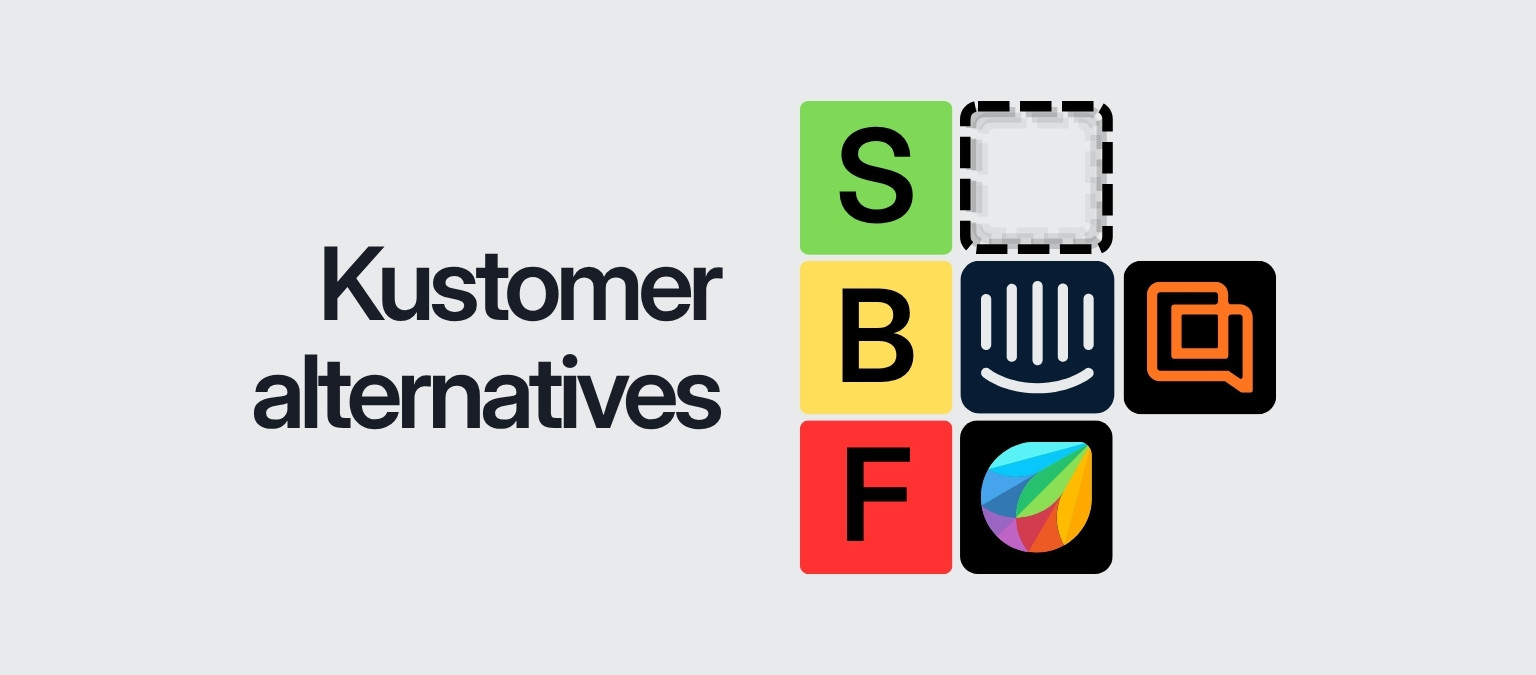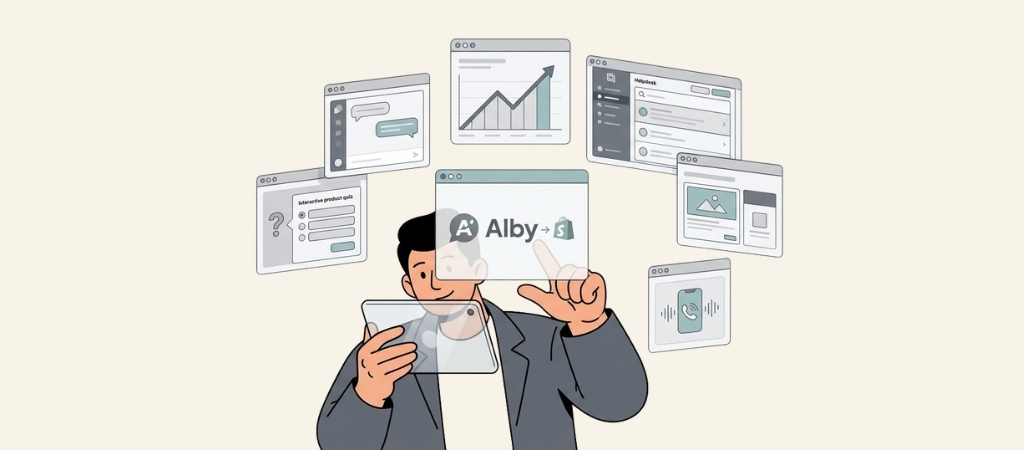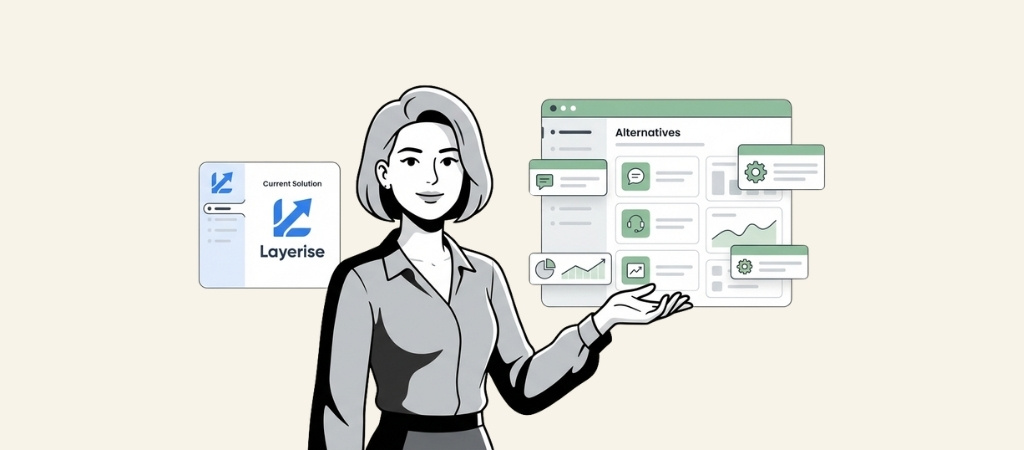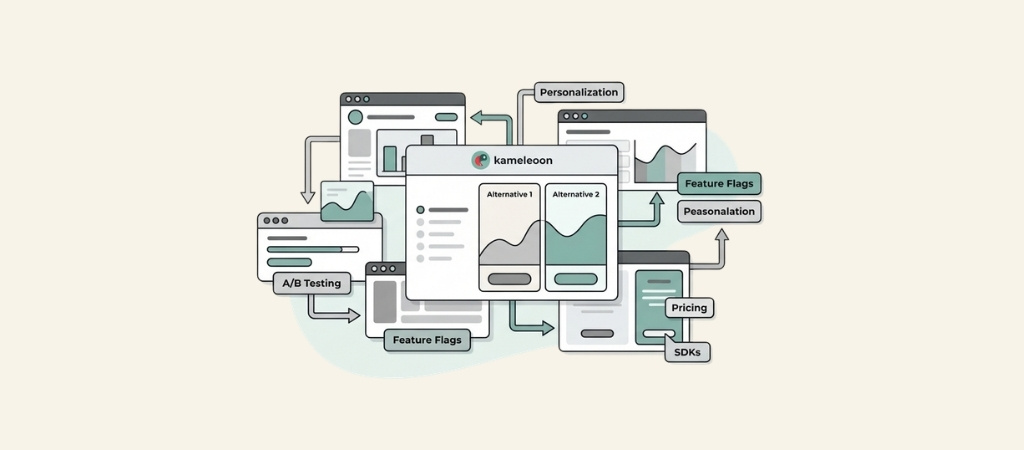In this guide I will help you find the best Kustomer alternative to use for your business in 2025.
Short answer:
The best Kustomer alternatives are:
- If you just want live chat, use Tidio. (Starts at $29/mo)
- If you are a larger business, I would recommend Zendesk. (Starts at $55/mo)
- If you need AI phone support for Shopify, use Ringly.io. You only start paying for Ringly when your AI phone agent at least 60% of your support calls
Ringly averages a 73% resolution rate on over 2,100 active Shopify stores.
See the TL;DR table below for a quick comparison from all the tools that I tested.
Below the TL;DR table you will find an in-depth review for every single tool as well.
How I tested each tool: stopwatch from signup → onboarded. I installed the tool on a Shopify store, installed all the basic features, just the ones that I need to get started.
Note: All of these tools cover the basics. I’ll only go over standout features that are unique to each tool specifically.
TLDR Kustomer alternatives
1. Ringly.io: AI-Driven phone support for Shopify stores
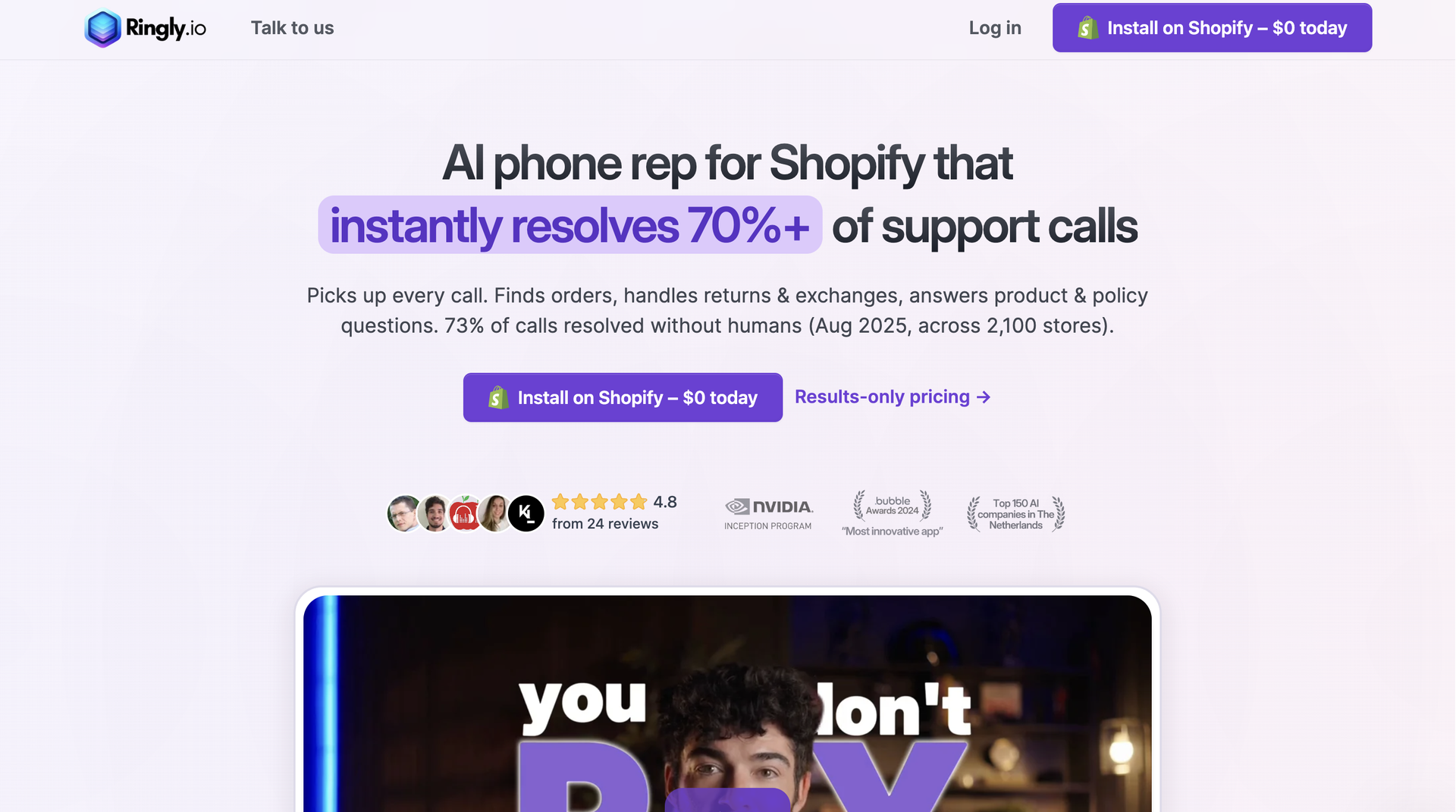
Best for Shopify stores looking for the best way to offer 24/7 AI phone support at a fraction of the cost.
How it went when I tried setting up Ringly:
After I installed the Shopify app, the only thing I had to do was to upload my data to the knowledge base. (website was uploaded automatically)
After I did that, I could already speak to my agent via a web call.
Setting it live was as simple as picking a phone number with my area code from the dashboard. I was able to connect the number with 1 click. (The number is also free and included)
There was not really anything else to the setup.
They claim that out of the box, their agents resolve an average of 73% of support calls. They back that up with data from over 2,100 active Shopify stores.
Signup -> onboarded took only 4 minutes and 12 seconds. Most of that time was spent waiting for the knowledge to be uploaded.
Over the first 2 weeks I used it (14-day free trial), it resolved 76% of my calls on its own.
The rest of the calls were escalated to a support ticket by my agent.
(update: the more calls you get, the smarter it gets. As of today, my resolution rate is 79%.)
Standout Features (pros):
- Very easy setup (almost none)
- Pay on results pricing
Pricing is on a results basis; you don't pay until your agent has at least a 60% resolution rate
Shopify integration is native. It will allow your agent to solve order status and refund requests on the phone.
Reviews are overall very positive, mainly because of the results-based pricing. If you don't pay unless you get results, every customer gets results.
Cons:
- Phone support only
What’s unique about Ringly is that it is the first AI phone support tool built for Shopify.
Editor’s note: Want to hear some sample calls made for your Shopify store?
- Just paste your store URL
- Get sample calls in under 20 seconds (no email required)
- Listen to demo calls for my store
2. Zendesk: The legacy leader with lots of integrations
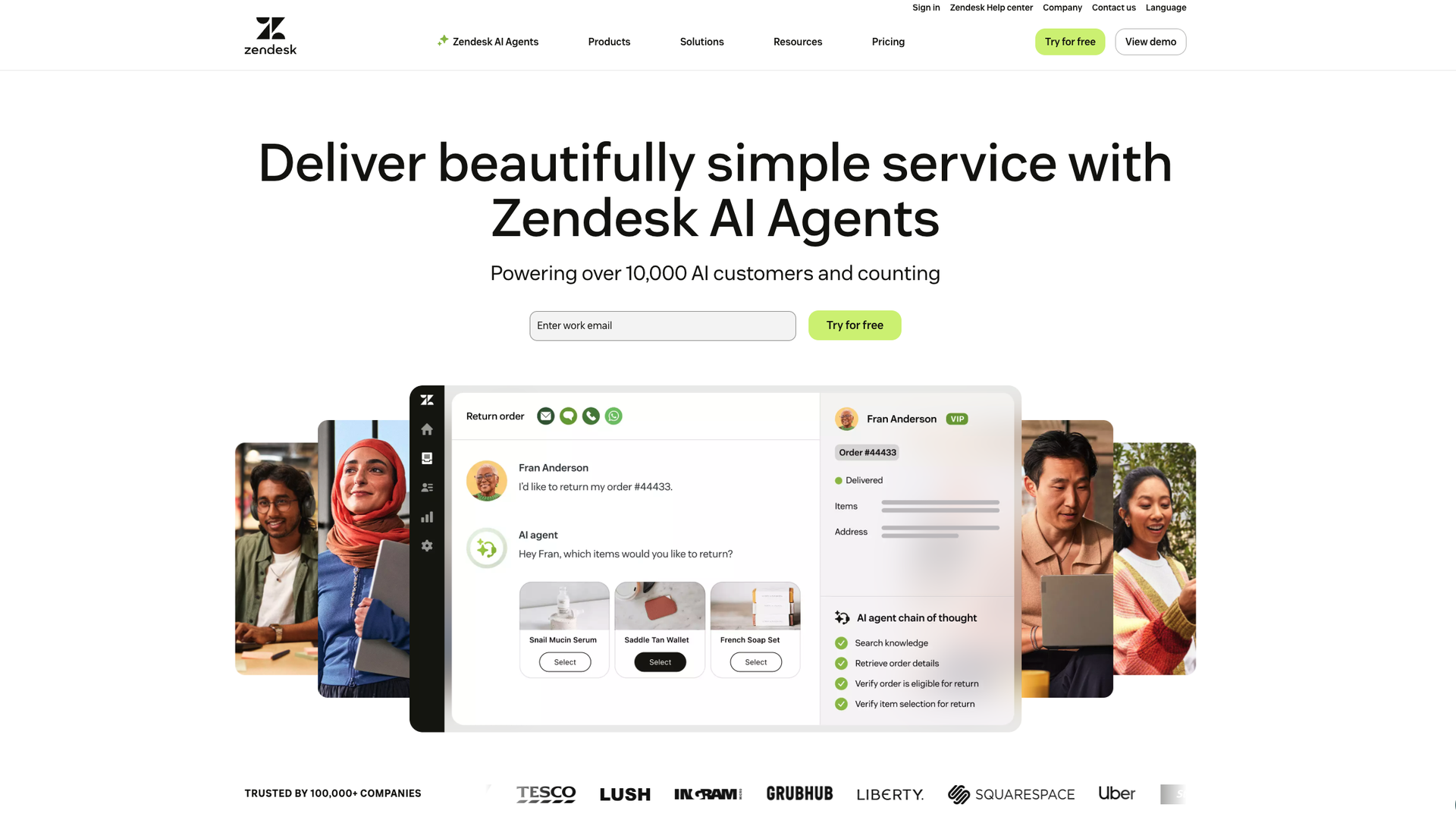
Best for: Bigger brands that need more enterprise-level tools. Zendesk offers one of the best customer service platforms out there.
How it went when I tried setting up Zendesk:
After signup they will guide you through all the steps required to get started. They immediately ask for your website to start training the AI agent.
After that, you will be guided through a demo ticket resolution, which was very helpful. Especially since the dashboard is a bit more complicated.
When using Zendesk over a period of 2 weeks, I mostly felt that I was not using most of the features.
So if you are a smaller to medium-sized ecommerce brand, I would not recommend this tool for you.
The product functions perfectly, though, and there were some things, like the macros feature, that I liked.
The AI agent is also decent, but I would say it not not as capable as some other agents that I have tested. It is mostly for filtering out the really simple tasks.
Signup -> onboarded took me exactly 17 minutes and 51 seconds. In that time, I set up the AI agent, invited my team, and set up all the routing rules for tickets.
Standout Features (pros):
- Scalable
- Older and proven platform
- A big ecosystem with other tools
Pricing starts from $55 per agent per month.
Shopify integration (is available through a native Shopify app that syncs order/customer data into tickets.
Reviews are not the best, on Trustpilot, they only score 1.9 out of 5, but on Capterra, they score 4.4 out of 5.
A common complaint is the lack of support available, billing issues, and people who feel they were misled.
On the flipside, some people say their support and platform are great, so reviews are mixed on several occasions.
Cons:
- Difficult to use
- Per agent pricing will get expensive fast
What’s unique about Zendesk is that you will probably never grow out of it.
3. Freshdesk: Scalable and affordable help desk
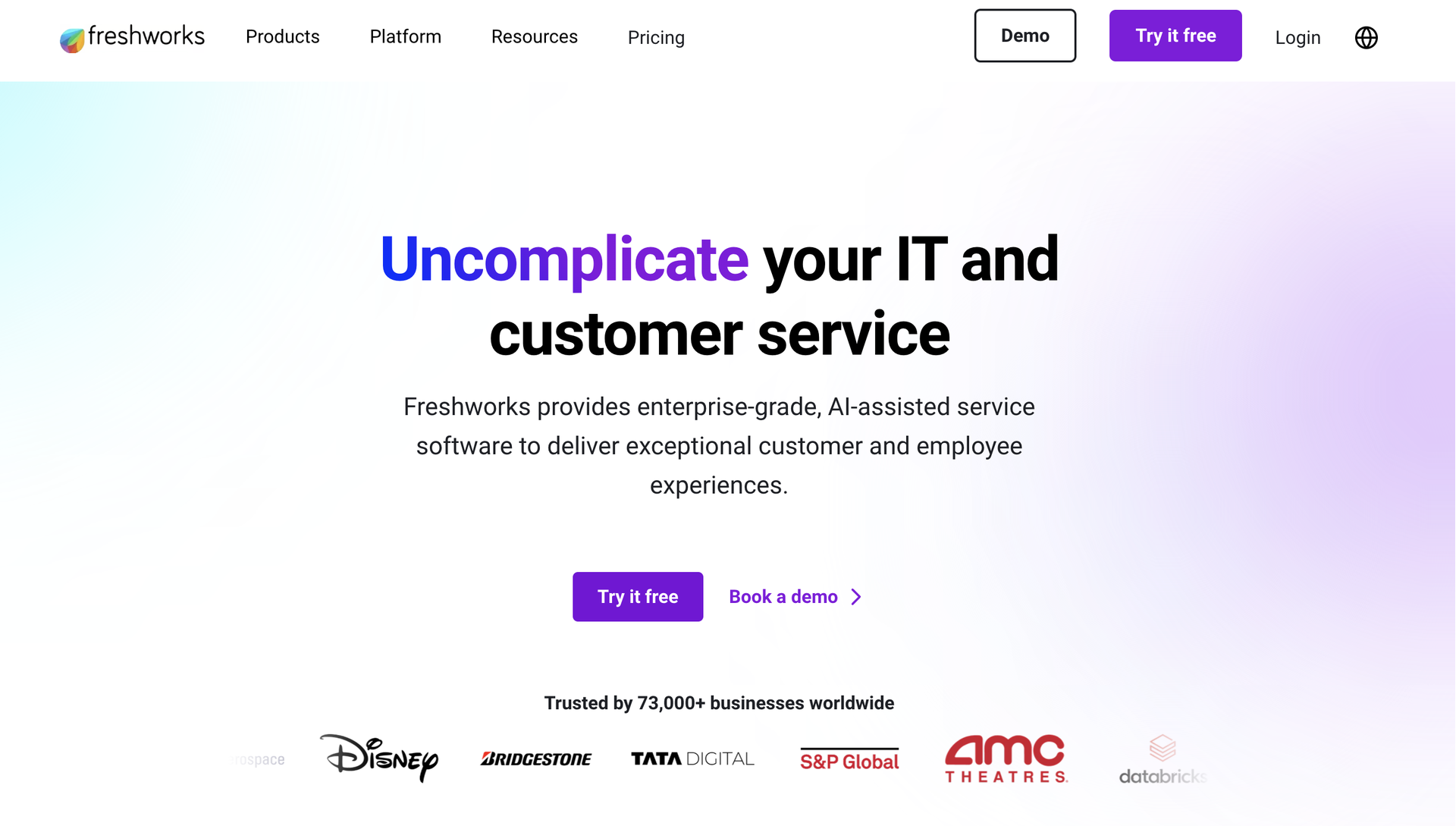
Best for: Smaller to mid size ecommerce stores that just want to automate customer support and manage support tickets.
How it went when I tried setting up Freshdesk:
After signing up, they immediately ask you if you have used similar helpdesk tools before.
I selected that I did not, and they sent me to a page with step-by-step instructions and videos to help me get started..
They break up the onboarding into 3 steps: connecting your email, getting to know the dashboard, and inviting your teammates.
The only thing I had to do was follow along exactly with these steps.
Their dashboard looks very good and is easy to navigate.
Unlike other tools, they also prefill data fields with dummy data. So it is significantly easier to understand what those features are.
One other thing that stood out that I liked was the confetti visuals every time I succeeded with a step in the onboarding.
Signup -> onboarded took me only 9 minutes and 41 seconds. Their onboarding is one of the best I have seen.
Standout Features (pros):
- Onboarding
- Very good knowledge base that adapts
- Most things are already set up when you give them your website
Pricing starts at $15/month per agent, and they offer a free trial.
Shopify integration is not native, but it does allow ticket creation directly from Shopify.
Reviews are mixed; on Trustpilot, they score a 2.6 /6, and on Capterra, they scored 4.5 /5
Most bad reviews were because of either the product not living up to expectations or claims of bad business practices.
The positive reviews often mentioned the high level of support, and there were also a lot of people that are very satisfied with the product.
In my opinion, most of the bad reviews come across as angry customers who were not really fair in their judgment.
Cons:
- Some newer features are a bit chaotic
- Not a lot of customization on the lower tiers
What’s unique about Freshdesk is that they offer enterprise-level automation features for normal non-enterprise pricing, and they are also easy to get started with.
4. Gorgias: Ecommerce support with revenue tracking
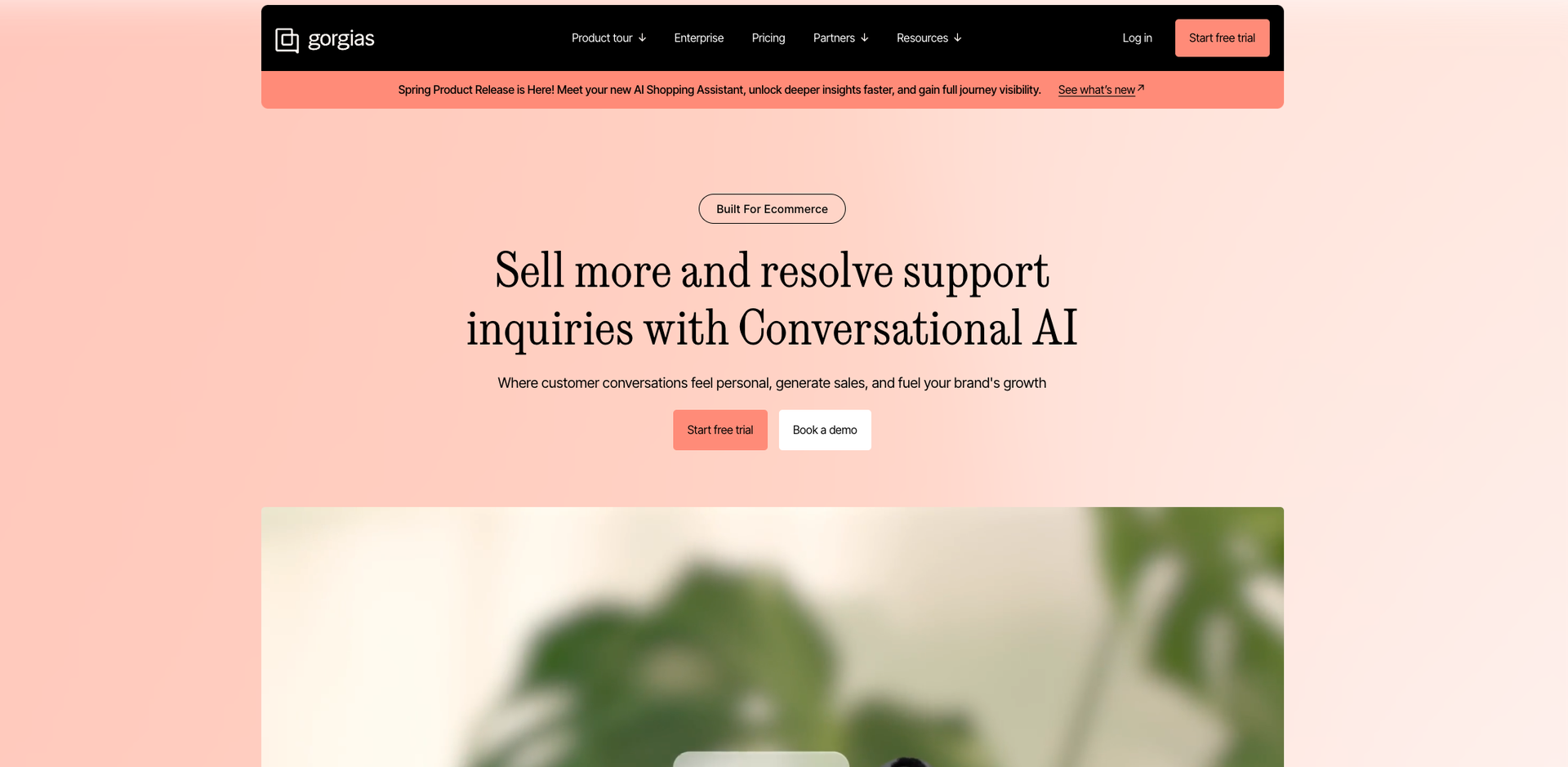
Best for: Businesses that are looking for a customer service platform designed for online stores. Gorgias is a customer service leader for Shopify stores.
How it went when I tried setting up Gorgias:
After the signup, I was led straight to the onboarding. They first ask you to connect your email and Shopify store, which is easy to do, and they have good documentation.
After the setup, navigating the platform was a bit difficult. I think the large number of features can be overwhelming.
What stood out most to me was the convert feature, which is something I have not seen anywhere else.
This feature will keep track of how much money you are making from your support. Every support tool should have this, in my opinion.
Setting up the AI agent was almost no setup at all, after I already connected my Shopify store.
Signup -> Onboarded took me exactly 9 minutes and 43 seconds. You can expect about the same for small to medium Shopify stores.
Standout Features (pros):
- Support profit tracking
- AI Analytics
Pricing starts at $10/month for 50 tickets, and scales according to the number of tickets required.
Shopify integration is native (Shopify app). And syncs customer information like orders and refunds from Shopify automatically.
Reviews are mixed; on Trustpilot, they score 3/5, and on Capterra, a 4.6/5. Most negative reviews focused on the price being too high or complaints about Gorgias' cold outreach.
I could not find a lot of complaints about the quality of the product. But there were quite a few 1-star reviews from people complaining about the in-app support. (A little ironic for a support tool)
Cons:
- More expensive per ticket
- Dashboard feels a bit outdated
- Lacks good phone support
What’s unique about Gorgias is that it connects support to revenue. And, they are the most popular and proven for Shopify merchants.
5. Intercom: Conversational bots and onboarding
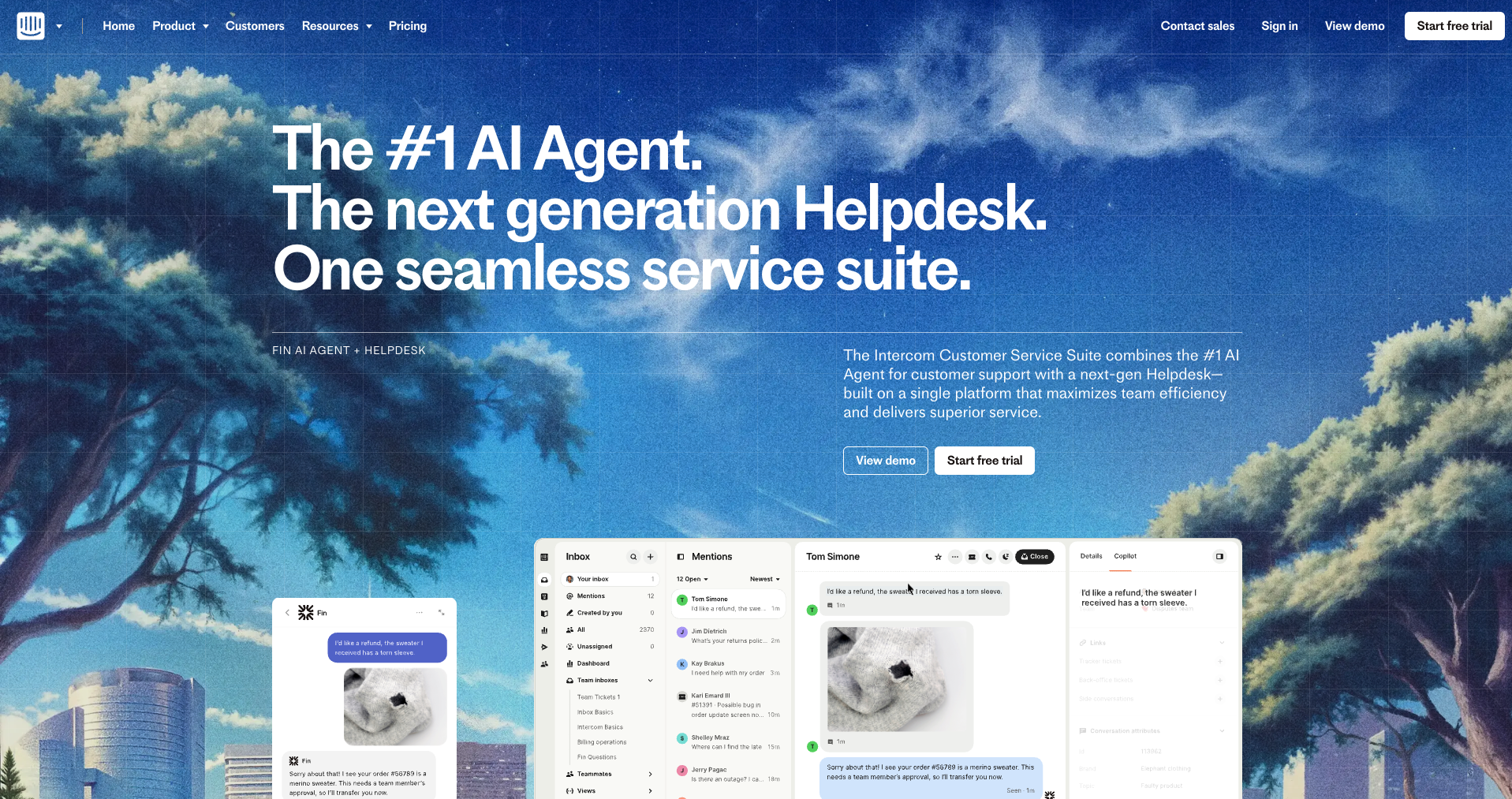
Best for: Brands that want a mix of automation, personalization, and conversational customer intercom customer communication.
How it went when I tried setting up Intercom:
You have to start a trial to get access to the platform, but you don’t need to give them your card details. After I signed up, they asked if I had experience using similar tools.
I selected that I did not, and I was sent to a page showing the 5 onboarding steps to get started. I just needed email and chat support.
Setting up the chat was pretty simple. I used the Shopify plugin to add it to my website. Email, on the other hand, is a bit more difficult because you need to set up email forwarding.
But the documentation was very clear and useful, so I did not really have any problems.
The next thing they asked me to set up was their AI agent called Fin. This is a product that they also sell separately. But using it together with Intercom makes it even better in my opinion.
Training the agent is as simple as choosing from templates and adding your knowledge.
Signup -> onboarded took me a bit longer. 16 minutes and 21 seconds, which is mainly because of the large amount of features they offer.
And although these features are complex and robust, they make setting them up very accessible.
Standout Features (pros):
- Fin AI, beat AI chat agent available right now
- Best looking UI
- All-in-one solution
Pricing starts at $39/seat per month, and Fin AI is charged per solved resolution. ($0,99)
Shopify integration will sync customer data and trigger messages based on store behavior.
Reviews are pretty good, a 3.1/5 on Trustpilot and a 4.5/5 on Capterra. Most people are happy about the fact that this one platform offers an all-in-one solution.
The negative reviews were mainly about the pricing or their support not being good enough.
Cons:
- Pricing, AI resolutions, and seats are way more expensive
- Steeper learning curve
What’s unique about Intercom is that it combines support, sales, and onboarding into one tool. Intercom is not really an e-commerce help desk, but more focused on SaaS and product lead companies.
6. Zoho Desk: Customizable helpdesk on a budget
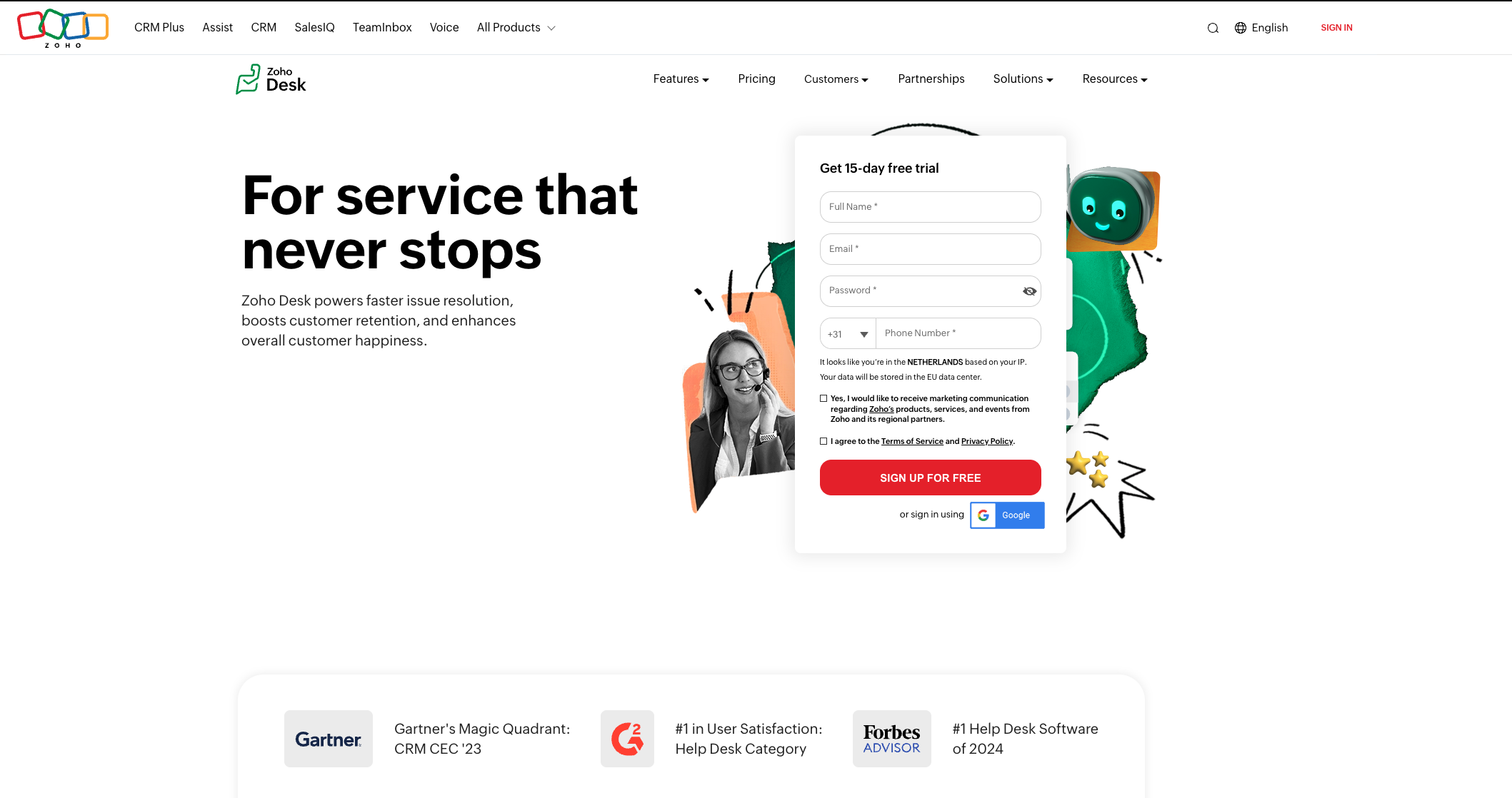
Best for: Merchants on a budget that still want automation and an overall strong ticketing system.
How it went when I tried setting up Zoho Desk:
After signing up, the only things I got shown were pop-ups to sign up for some event. So there was not really an onboarding experience.
So I tried to set up the platform myself, and it is very different from the other platforms I tested.
For instance, they sort tickets in a pipeline, kind of like you would with leads in a CRM. This seemed odd to me at first, but it does make sense once you start using the tool.
This feature also gives your team a positive feeling every time they can drag tickets to the finished section.
Overall, the platform is very simple; it does what it needs to do and not much more. They also have analytics, but they are not special.
One thing I missed was some sort of AI feature; it seems like they don’t offer any AI features for their helpdesk yet.
Signup -> onboarded took me not that long because there was not much to set up. It is basically only a ticketing tool, and the setup was done in 11 minutes and 19 seconds.
Standout Features (pros):
- Context-aware ticketing
- Integrations with other Zoho apps
- Affordable
Pricing starts for free up to 3 seats; after that, it is $14/month per seat.
Shopify integration is not native, so it requires a more manual setup, but it does the basic stuff like sharing order and customer info with the helpdesk.
Reviews are only available on Capterra, and they score a 4.5/5. Most users report a good user experience, but weird bugs are a common theme.
Cons:
- UI is a bit dated
- I found more bugs with things like uploading larger datasets
- No AI
What’s unique about Zoho Desk is that it has a very generous free plan, and Zoho also offers other tools besides just a help desk.
7. LiveAgent: Feature-Rich helpdesk with built-in call center
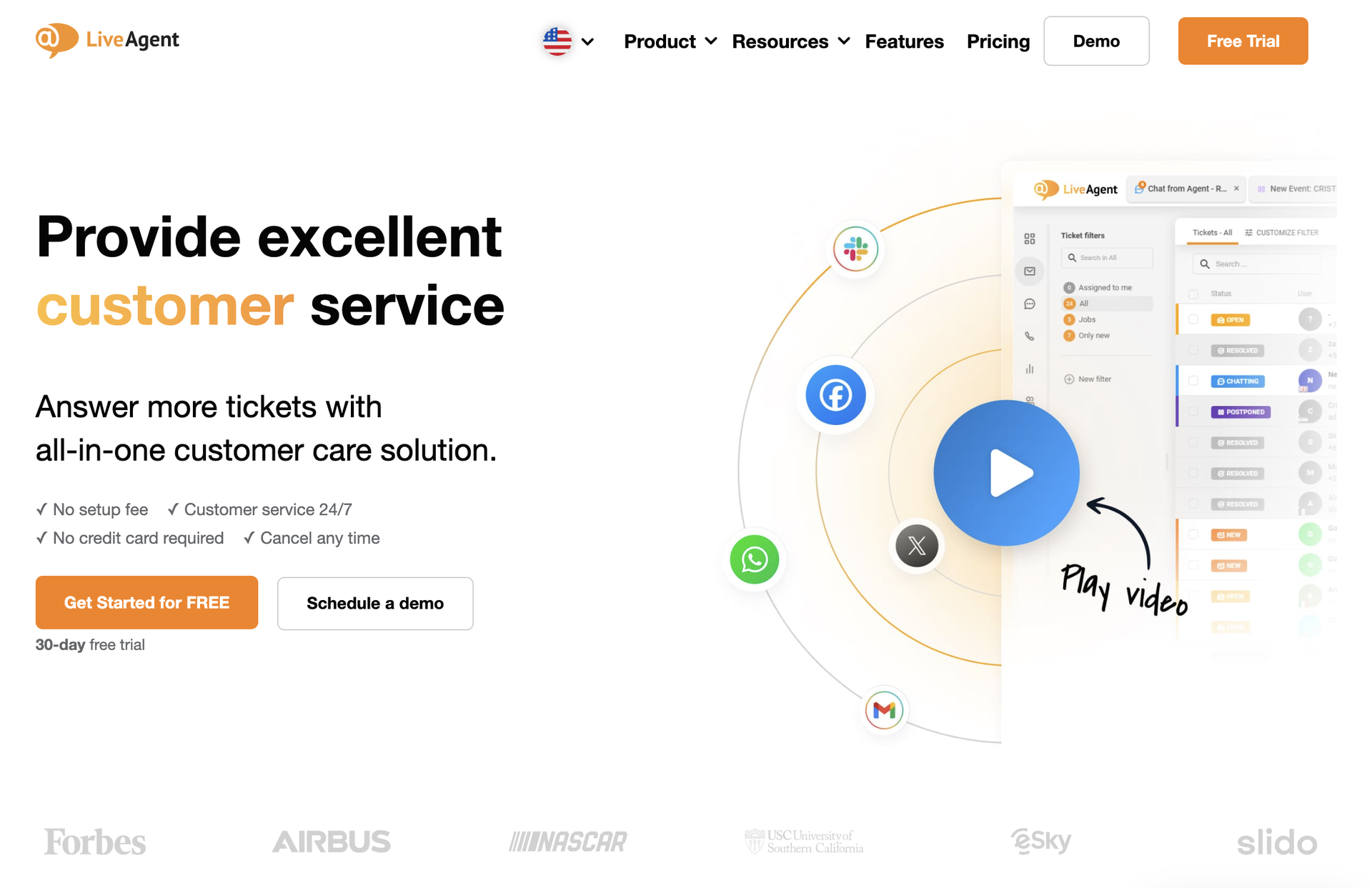
Best for: Smaller ecommerce teams that need live chat and phone support in one tool.
How it went when I tried setting up LiveAgent:
After signing up, I was redirected to a quite confusing page. On there, I could select my preferred channels.
I only later discovered that this was not the onboarding page, but I had to go to my email inbox to set up my password first. So a confusing start, I would say.
Once I had access to the dashboard, I could start the onboarding, which consisted of 9 steps. They were well explained, but there was a lot of information at once.
I did manage to get through it and connected all my social channels. And I installed the live chat on my Shopify store manually by putting the code in the header. I also set up a phone support number.
Setting up their AI chatbot was pretty confusing and not intuitive at all. I think this is a newer feature that is not really optimized yet.
I did like the map they gave me, where I could see the location of my customers. But it was a bit clunky, and that was the overall feeling of the platform. At times, it was slow and felt dated.
After 2 weeks of using the platform, I experienced a capable helpdesk with lots of support channels. But there were definitely irritations while using the platform.
Signup -> onboarded took me quite a while, 23 minutes and 12 seconds. I did set up a lot of channels, though, including phone support.
I struggled the most with getting the AI agent to function properly. And still, after using that for 2 weeks and tweaking it, it did not get me the results I expected.
Standout Features (pros):
- Built-in VoIP call center
- Gamification tools
Pricing starts at $9/month per seat.
Shopify integration allows for order data and customer data to be shared with LiveAgent.
Reviews are, to my surprise, pretty good; they score a 4/5 on Trustpilot, they have no 1-star reviews there, and all the worst complaints I could find were that there was a notification bug. On Capterra, they score a whopping 4.7 out of 5.
Cons:
- UI feels dated
- Not a lot of options for integrations
What’s unique about Live Agent is that it offers omnichannel support and a lot of normally more expensive features at entry-level pricing.
8. Help Scout: Human-Focused ticketing and collaboration
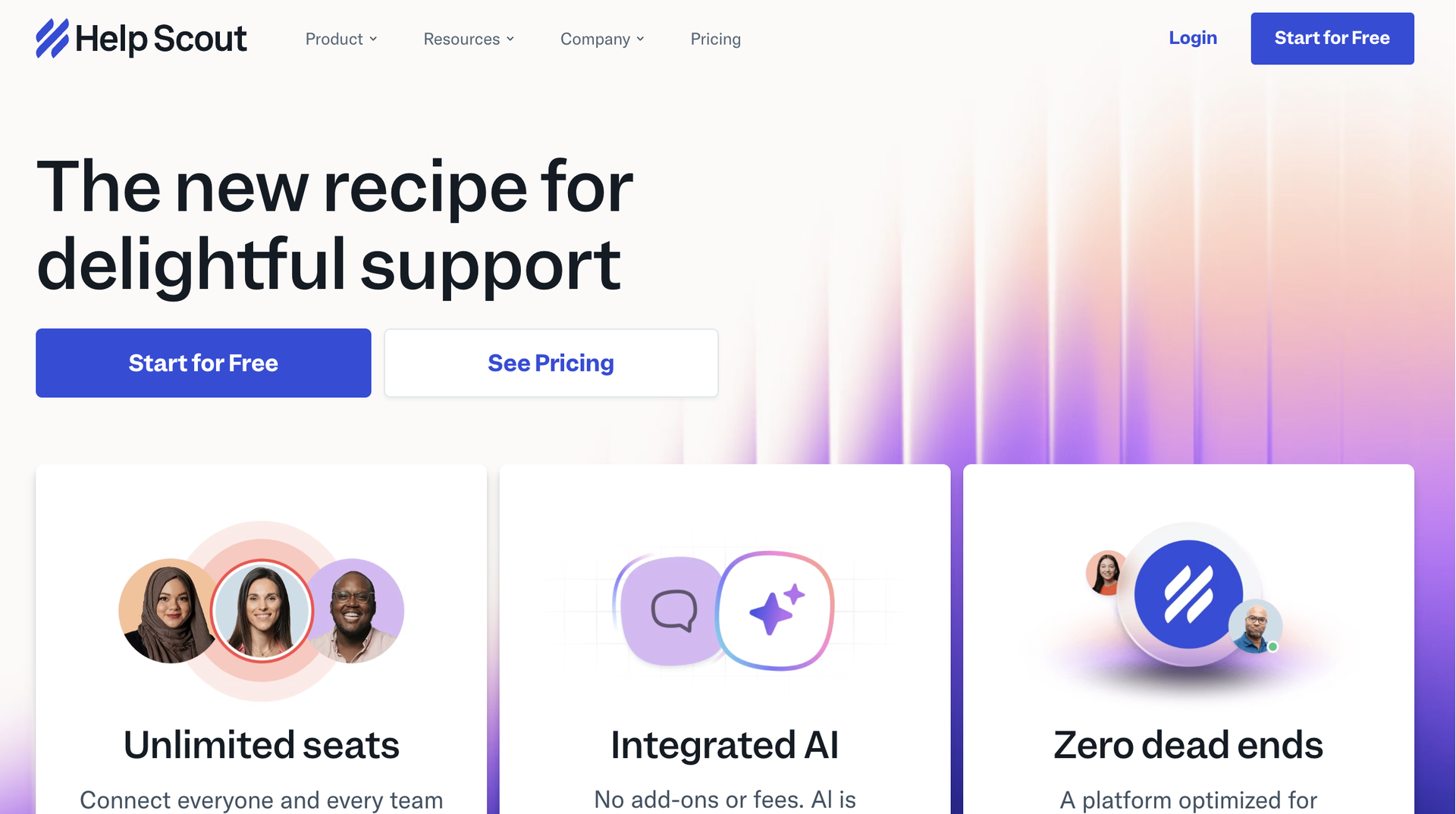
Best for: Ecommerce brands that prioritize customer experience and simplicity.
How it went when I tried setting up Help Scout:
After I signed up, the only onboarding I got was some explanations of where to find certain features. They also offered me to sign up for a tour, where they walk you through the product.
The layout of the platform differs from others. For instance, the navigation bar is at the top of the screen and horizontal.
The messaging inbox was a bit difficult to oversee compared to other platforms I tested.
So, navigating that part and responding to tickets is not the best, but still pretty solid.
Overall, I did manage to get the platform to function pretty easily. But I can imagine that if you have never used a similar tool before, you would need to schedule a demo to get started.
Signup -> onboarded took me 13 minutes and 14 seconds. Connecting to Shopify was the hardest part. I have not fully set up my documentation yet, just the most basic FAQs. If you don't have that set up already, it will take some extra time to get started.
Standout Features (pros):
- AI features are actually useful, unlike some other platforms
- Included hosted documentation
Pricing starts at $20/month per user.
Shopify integration will give access to customer data and allow AI/human reps to handle everything without leaving Help Scout.
Reviews get a score of 3 /5 on Trustpilot and a 4.4 /5 on G2. Most negative reviews I could find were related to missing features.
Ease of use is the most common positive review theme.
Cons:
- Not really special, poor onboarding
- Missing some features that other tools offer
What’s unique about Help Scout is that it is easy to use while still being scalable. Unlike tools like Zendesk.
9. Salesforce Service Cloud: Enterprise powerhouse
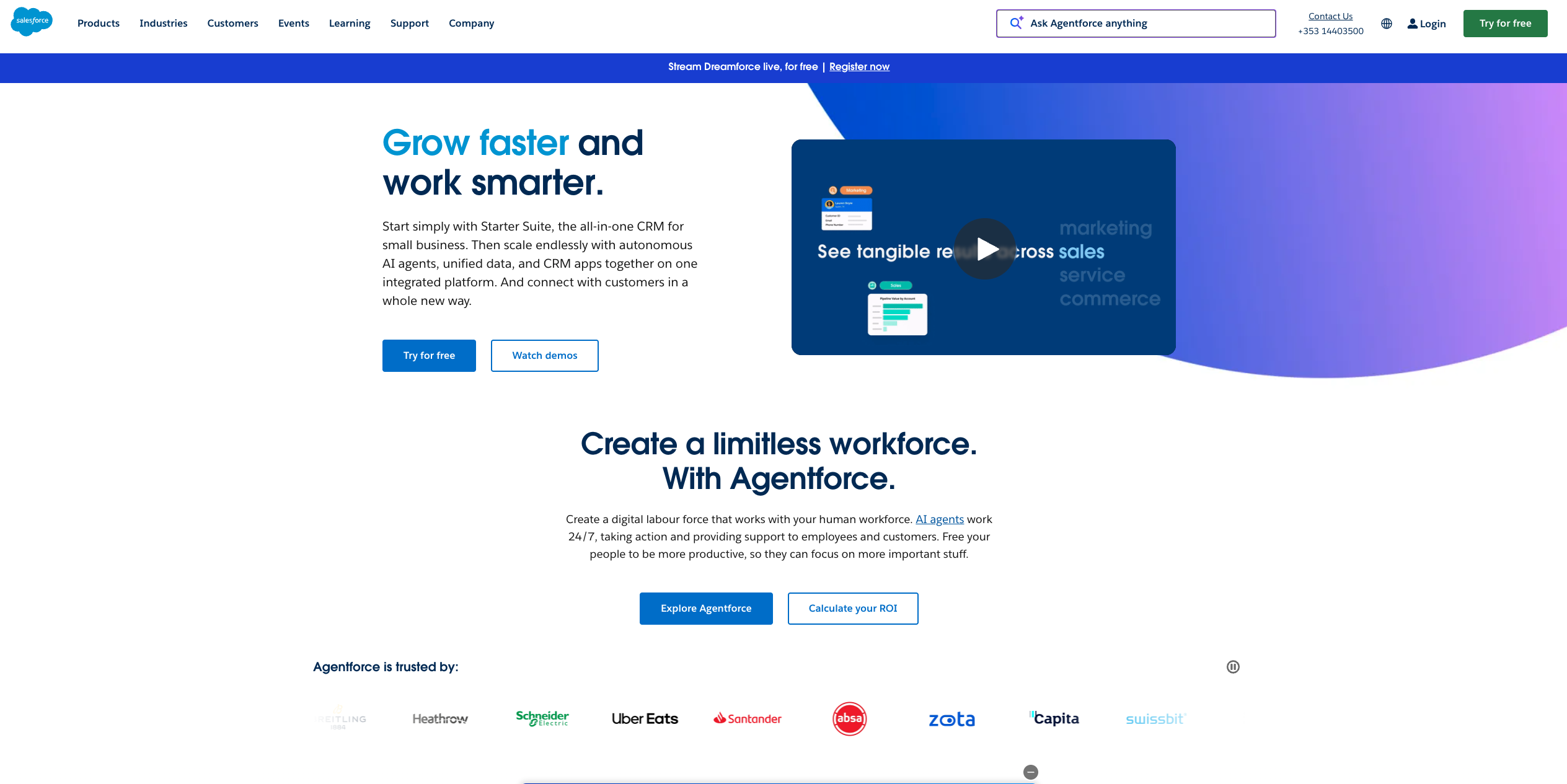
Best for: larger businesses that need an advanced CRM and automation.
Standout Features (pros):
- Almost unlimited scalability and customization
- Integrates with other Salesforce tools
- Enterprise-level security
Pricing starts at $25/month per user.
Shopify integration is available via third-party connectors, but requires a more custom setup.
Reviews are good; they score a 4.5 /5 on Capterra, and most complaints are about the prices being too high. But overall, people are very positive, which is expected from a tool with the backing of Salesforce.
Cons:
- Difficult to navigate and set up
- Overkill for smaller businesses
What’s unique about Salesforce is that it is a part of the largest tech companies in the world, but that also makes it definitely an enterprise solution and overkill for smaller businesses.
They are always going to be broader, and there will probably be better options available for your niche specifically.
10. Re:amaze: Chat and helpdesk for DTC
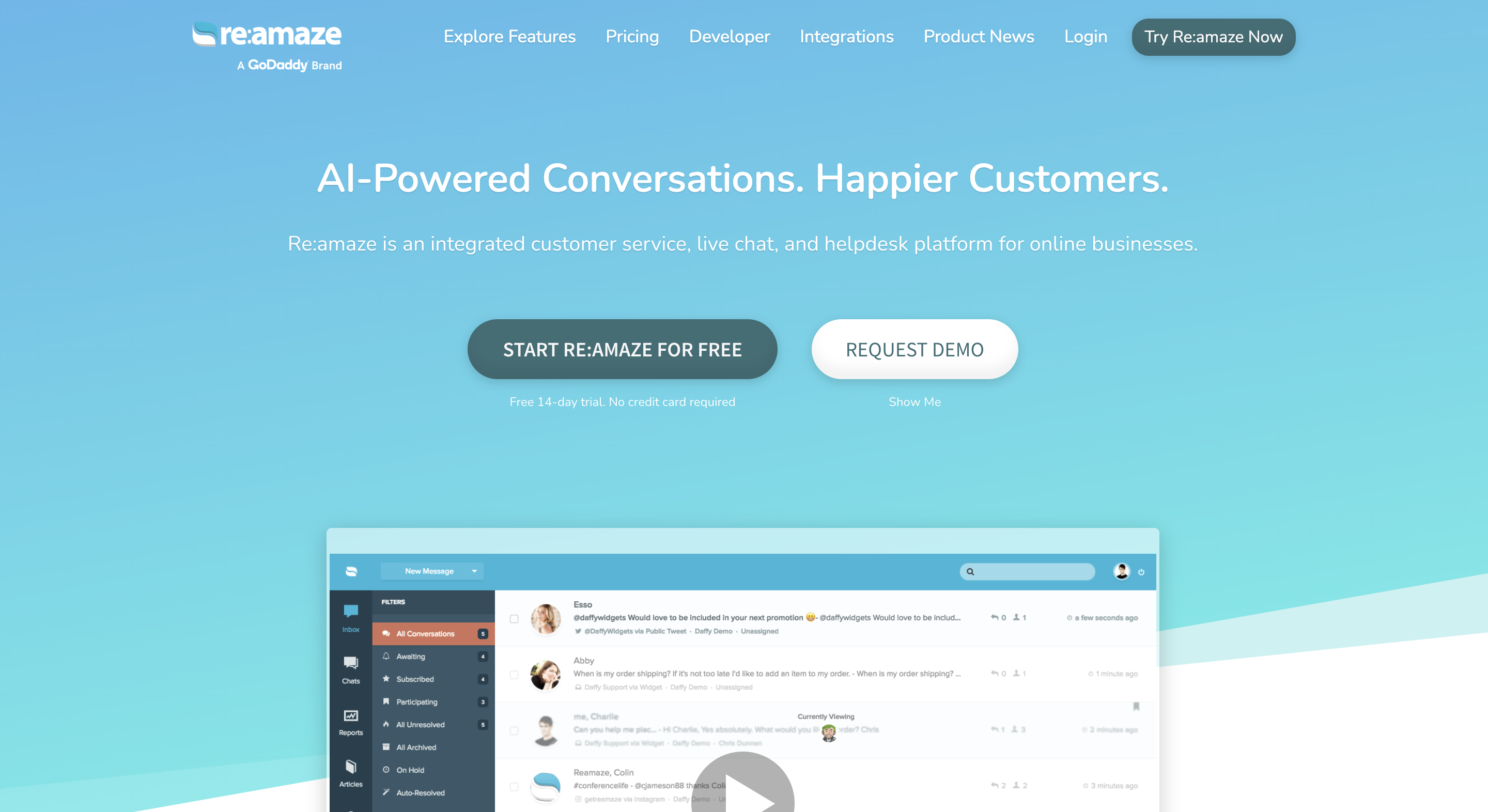
Best for: DTC brands that rely heavily on live chat and automation for Shopify.
Standout Features (pros):
- Built for ecommerce
- SMS support
Pricing starts at $29/seat per month
Shopify integration allows you to view and edit order info directly from the helpdesk, and has some data integrations too.
Reviews are good; they score a 4.5 out of 5 on Capterra. People love the self-service approach, and it works with multiple e-commerce platforms.
Difficulty of setup was the most common complaint I could find.
Cons:
- Not a lot of AI is involved in the product
- UX is not the best
What’s unique about Re:amaze is that it offers multichannel support at a low price.
11. Gladly: AI Powered CS
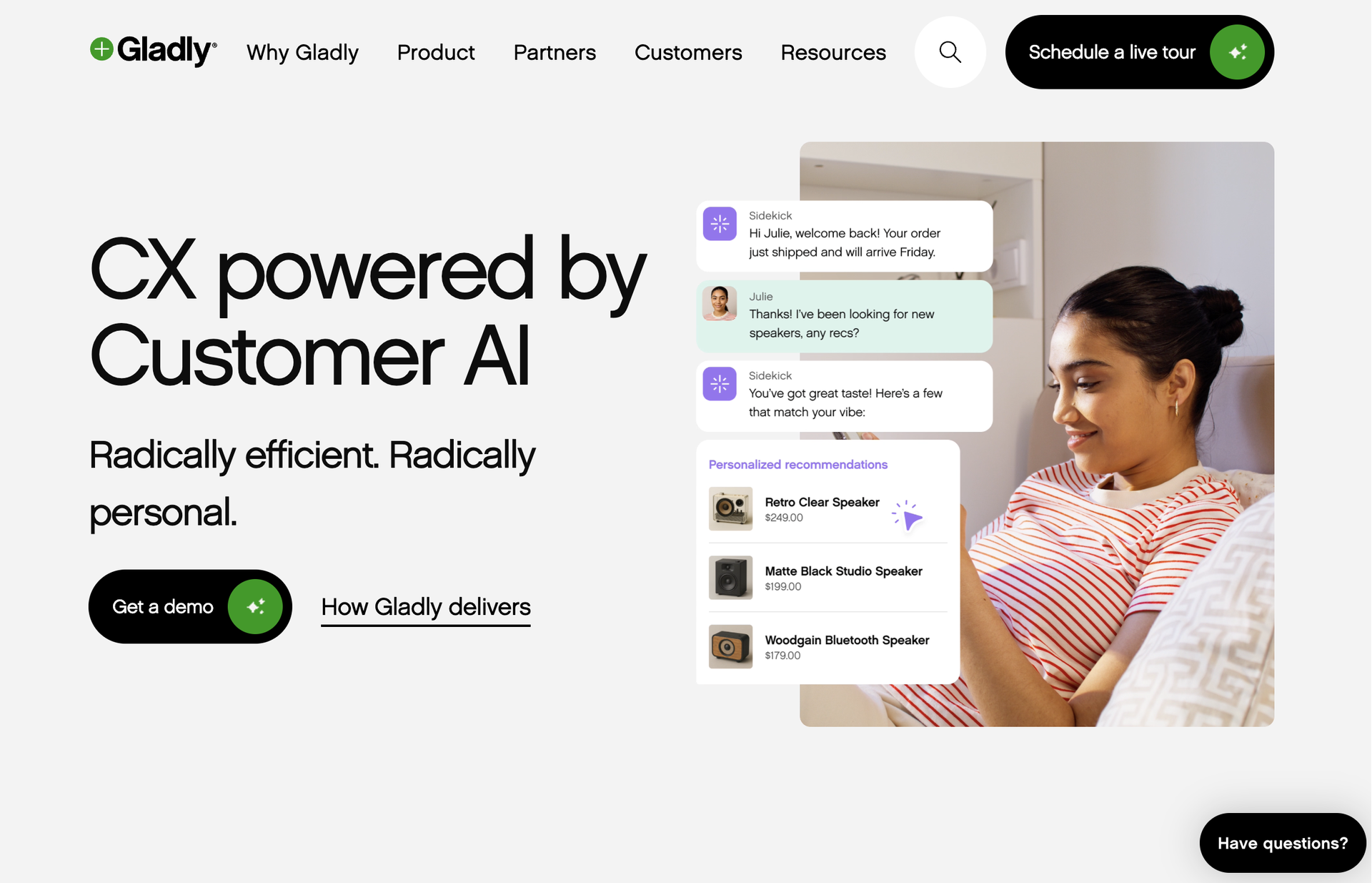
Best for: Brands that want to have one continuous customer interaction across platforms instead of multiple separate support tickets.
Standout Features (pros):
- Customer-centered model (no tickets)
- Personalization and retention features
Pricing is completely custom based on your needs.
Shopify integration will sync order status, refunds, and customer details in real time.
Reviews are good; they score 4.8 out of 5 on Capterra. People are positive about the hands-on and customer-first approach. Although I think this score could be a bit inflated, since they have no reviews that are lower than 4 stars.
Cons:
- Quite a lot more expensive than other SMB’s
- Too complex for smaller businesses
What’s unique about Gladly is that it organizes communication by customers instead of tickets, and it always puts the customer experience first.
What to look for in a Kustomer alternative
1. Make sure the tool you pick connects to your ecommerce platform.
2. Does the tool offer multiple channels for omnichannel reach?
3. Think of how much of your support can be taken over by AI, and which tool offers those capabilities.
4. Can the tool you pick scale of demand without having to hire?
5. Is the pricing model aligned with your goals?
Conclusion
Finding an alternative to Kustomer is not just about finding a cheaper tool.
The focus should always be on giving its customers the best experience.
If you need to automate phone support, Ringly.io is the best option.
If you just need live chat, Tido and Gorgias are great options.
For enterprise I would recommend Zendesk
FAQs
Does Ringly offer a guarantee? Yes. You don’t pay until we resolve at least 60% of your calls autonomously.
Does Ringly work with my current helpdesk? Yes. Ringly can escalate tickets to your existing helpdesk, and you have full control over what gets escalated. Ringly works with platforms like Gorgias, Richpanel, and others.
How does the AI handle order tracking? Our AI pulls data directly from Shopify to answer "where is my order" questions on every live phone call.
Can I forward my existing number? Absolutely. You can use call forwarding to send your business calls to your team.
How do I get started? We offer a free trial so you can start without any risk.



